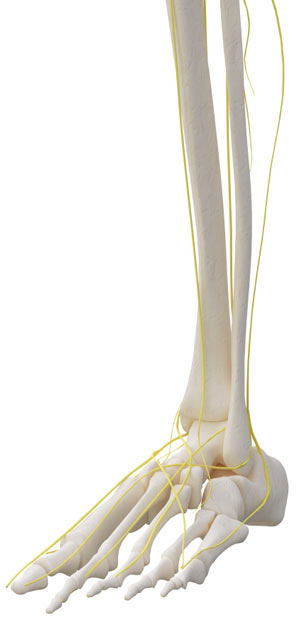Alpha Lipoic Acid Improves Symptoms of Diabetic Neuropathy

Hundreds of millions of people worldwide suffer from diabetes, a common cause of peripheral neuropathy. The risk of developing this painful and often disabling condition increases over time, from 10% of patients in the first year of diabetes diagnosis to 50% in 25 years. The chronic high blood sugar of diabetes increases free radicals that damage cells, blood vessels, and nerves. (iii.89)
Other health factors that are linked to increased risk for diabetic peripheral neuropathy include: (iii.77)
- High blood pressure.
- Smoking.
- High cholesterol levels.
- Being overweight or obese.
Neuropathy Also Affects the Heart
Diabetes also causes cardiovascular autonomic neuropathy (CAN) in about 25% of patients. Unlike peripheral and polyneuropathy, CAN is often symptom-free in its early stages. However, if left untreated this diabetic complication can cause severe and life-threatening symptoms — including the risk of sudden death. Abnormal heart rate responses are typically one of the first indicators of the condition. Some studies show that alpha lipoic acid may be able to slow the progression of CAN. (iii.90)
What Can Help Treat Diabetic Peripheral Neuropathy?
Strict control of blood sugar levels helps reduce and delay nerve damage. Even with monitoring blood sugar levels and using insulin many patients with diabetics have a hard time achieving control of the disease. Fortunately research indicates that there are some therapeutic compounds that can help maintain blood sugar control or treat the symptoms of diabetic complications such as neuropathy. (iii.89, 91)
So what properties do researchers look for in a compound to potentially treat diabetic neuropathy? Ideally, compounds that tackle the abnormal cell activity of both diabetes and neuropathy (such as alpha lipoic acid) while reducing symptoms could dramatically help. Other properties include: (iii.89)
| Therapeutic Activities Considered Helpful for Diabetic Neuropathy | Alpha Lipoic Acid Property? |
|---|---|
|
↓ Free radical (oxidative) stress. (iii.92) |
YES (iii.92) |
|
↓ Aldose reductase. This enzyme converts glucose to sorbitol. Excessive sorbitol disrupts nerve function and damages nerves. (iii.77, 87) |
YES (iii.93) |
|
Regulate calcium-channels in sensory nerves, which studies show may help relieve pain. (iii.94) |
YES (iii.95) |
|
YES (iii.95) |
|
|
↓ High blood pressure. Hypertension can make neuropathy worse. ACE inhibitors to treat high blood pressure may also directly slow down the progression of neuropathy. (iii.91) |
YES (iii.96) |
Clinical Evidence of Alpha Lipoic Acid Benefits
In 2003, researchers at the Mayo Clinic showed that patients with diabetic neuropathy who received high doses of intravenous alpha lipoic acid experienced dramatic improvement in symptoms. They also reported that alpha lipoic acid seemed to increase blood flow and oxygen to the nerves, and may actually improve the condition. These results may explain why in another clinical study, 3 weeks of alpha lipoic acid treatment (by IV) improved neuropathic symptoms and deficiencies for months. (iii.19, 88)
Other clinical trials showed the following:
| Study Details | Alpha Lipoic Acid Dosage |
|---|---|
|
Symptomatic Diabetic Neuropathy (SYDNEY) Trial (iii.87) Randomized, double-blinded, placebo-controlled clinical trial. |
Alpha lipoic acid ( |
| Patients | Type of Diabetes |
|
Type 1 or Type 2 Diabetes |
| Outcomes | |
|
|
| Study Details | Alpha Lipoic Acid Dosage |
|
The NATHAN 1 Trial (iii.92) Randomized, double-blinded, placebo-controlled clinical trial. |
Alpha lipoic acid ( |
| Patients | Type of Diabetes |
|
Type 1 and Type 2 Diabetes |
| Outcomes | |
|
|
| Study Details | Alpha Lipoic Acid Dosage |
|
The SYDNEY 2 Trial (iii.97) Randomized, double-blinded, placebo-controlled clinical trial conducted in 5 different medical centers (total) in Russia and Israel. |
600, 1200, or |
| Patients | Type of Diabetes |
|
Type 1 and Type 2 Diabetes |
| Outcomes | |
|
|
| Study Details | Alpha Lipoic Acid Dosage |
|
Alpha-Lipoic Acid in Diabetic Neuropathy (ALADIN) Study (iii.90) Randomized, double-blinded, placebo-controlled clinical trial. |
Alpha lipoic acid (1200, 600, or |
| Patients | Type of Diabetes |
|
Non-Insulin Dependent Diabetes |
| Outcomes | |
|
|
| Study Details | Alpha Lipoic Acid Dosage |
|
5-Year Retrospective Real-World Observation Study (iii.98) |
|
| Patients | |
|
443 patients with chronic diabetic neuropathy. |
|
| Outcomes | |
|
|
| Study Details | Alpha Lipoic Acid Dosage |
|
Open Clinical Study (iii.99) |
|
| Patients | |
|
|
| Outcomes | |
|
|

Alpha Lipoic Acid Works Better than Some Prescription Drugs
Research conducted in hundreds of patients with diabetic neuropathy showed that alpha lipoic acid supplements worked better than gabapentin, a conventional drug prescribed for the condition. It also had no intolerable side effects, was less expensive to use, and required less follow-up visits to the doctor. (iii.76)
Although gabapentin may help people in chronic pain from neuropathy sleep better, it also causes weight gain over long term use. Obesity and diabetes are intimately linked, inflammatory metabolic diseases. This could be a serious complication for diabetics. Conversely, clinical studies suggest that alpha lipoic acid can help people struggling with extra pounds and even obesity lose weight. (iii.94, 100)
Used in Germany for over 50 years to treat conditions related to diabetes, scientific evidence suggests that alpha lipoic acid could help treat diabetes by helping cells better metabolize glucose. Many more studies are now being conducted in the U.S. and around the world to determine the role of alpha lipoic acid in diabetes and insulin sensitivity. (iii.2, 19)
Recommended Dosage for Diabetic Neuropathy
Experts suggest that taking


